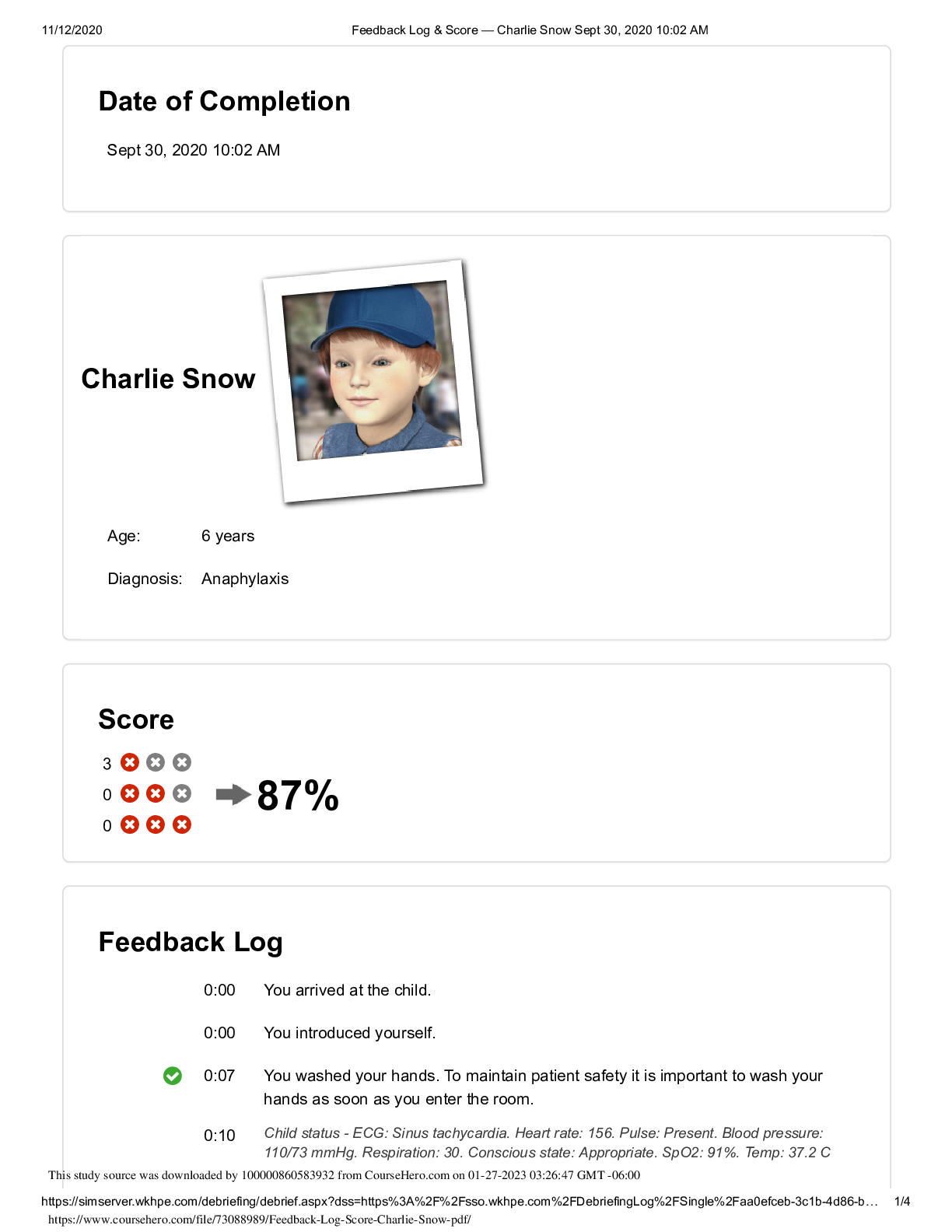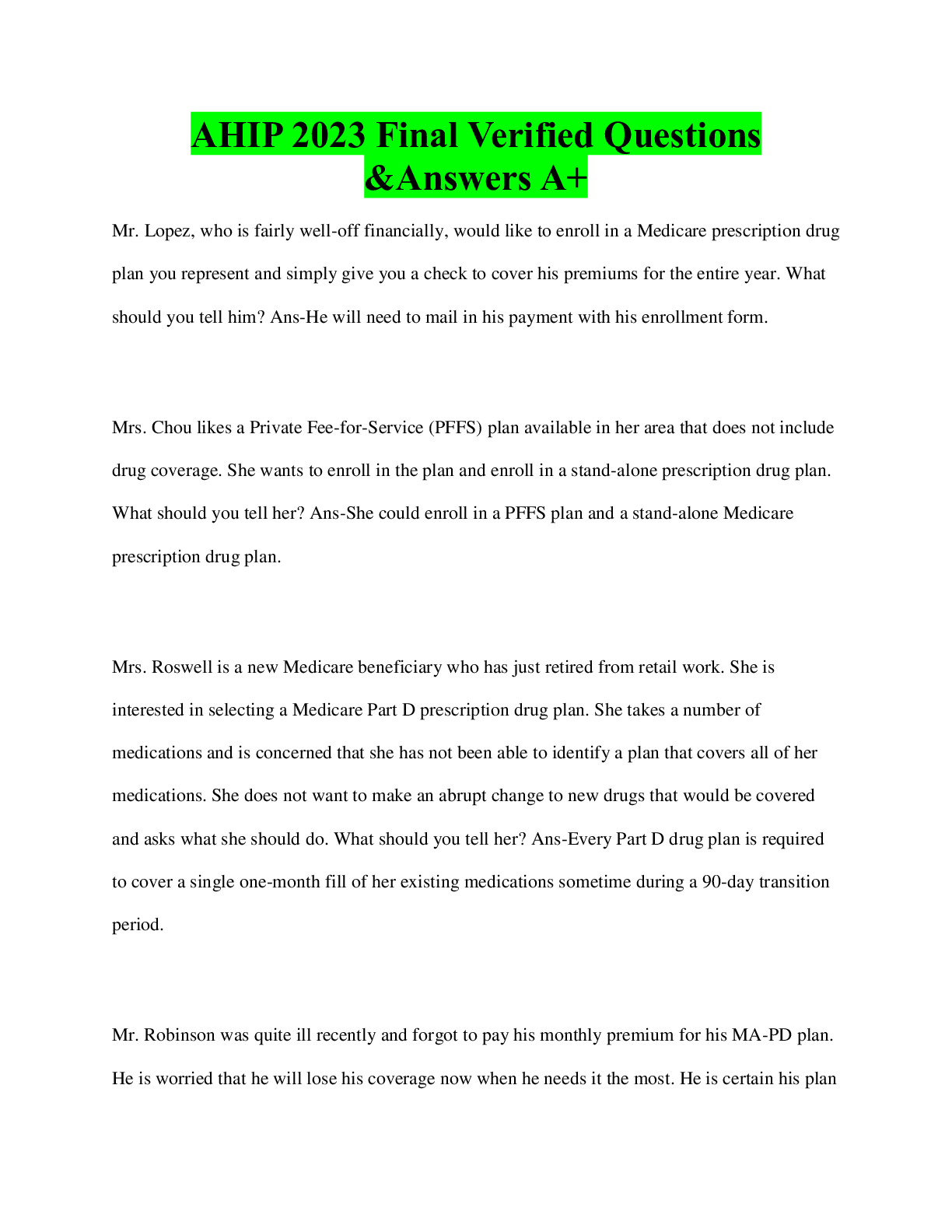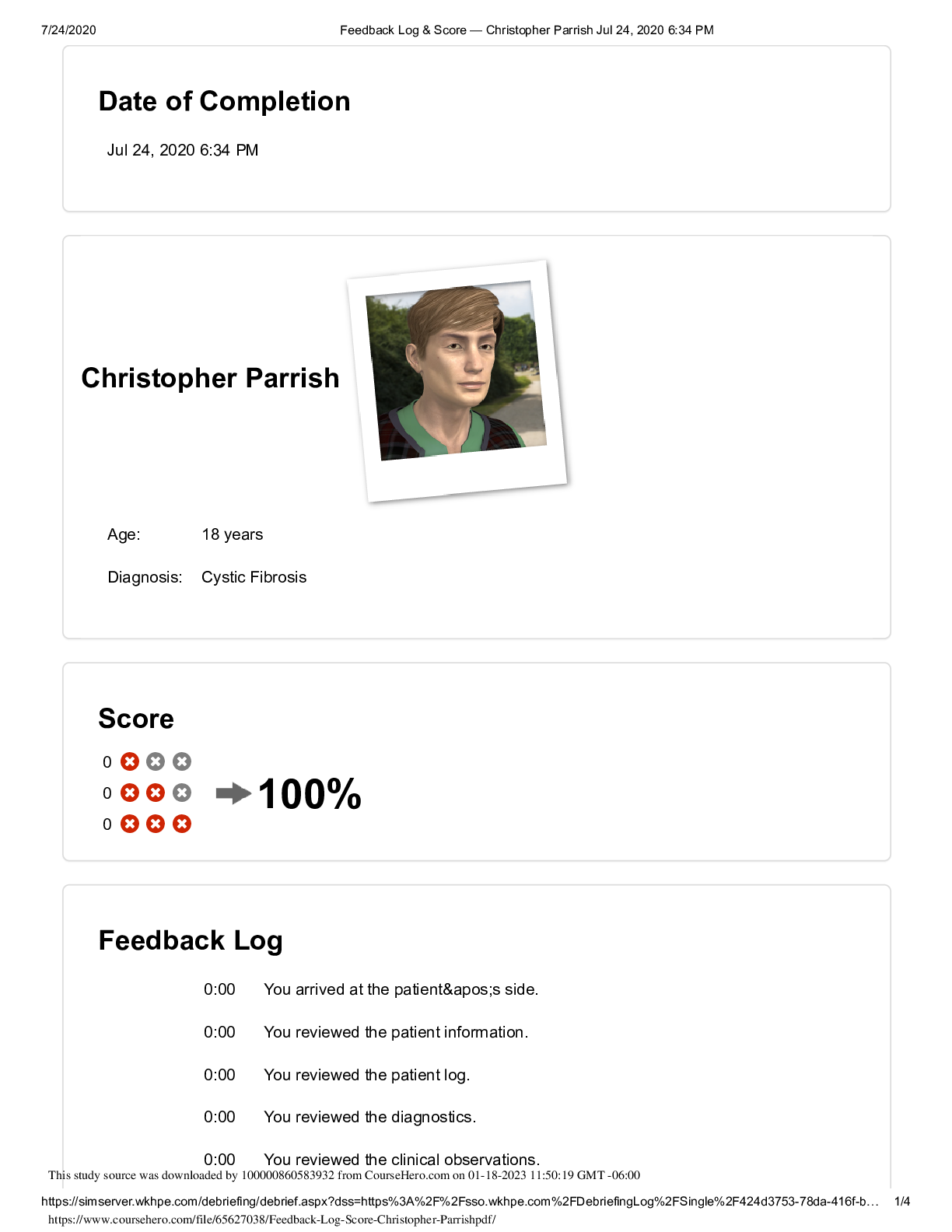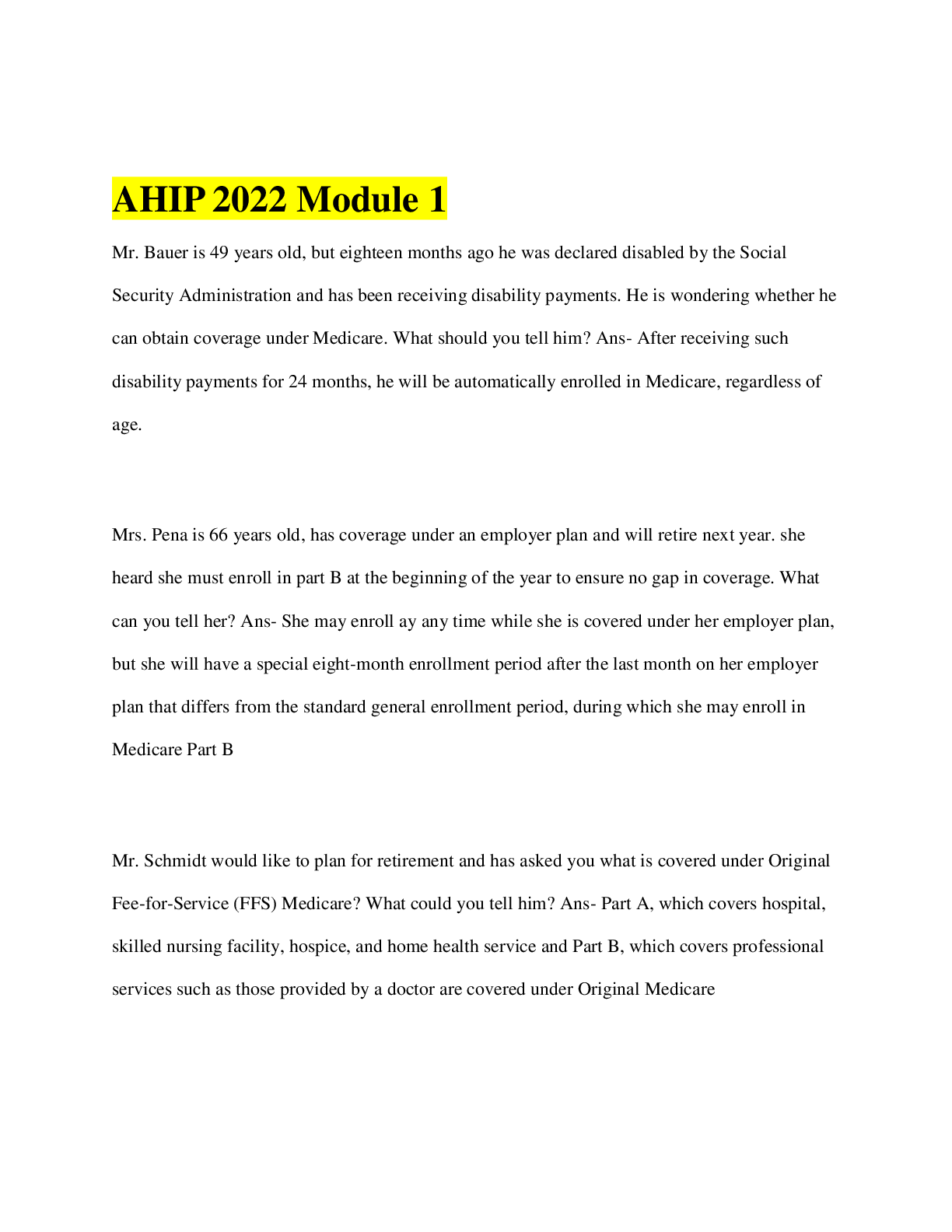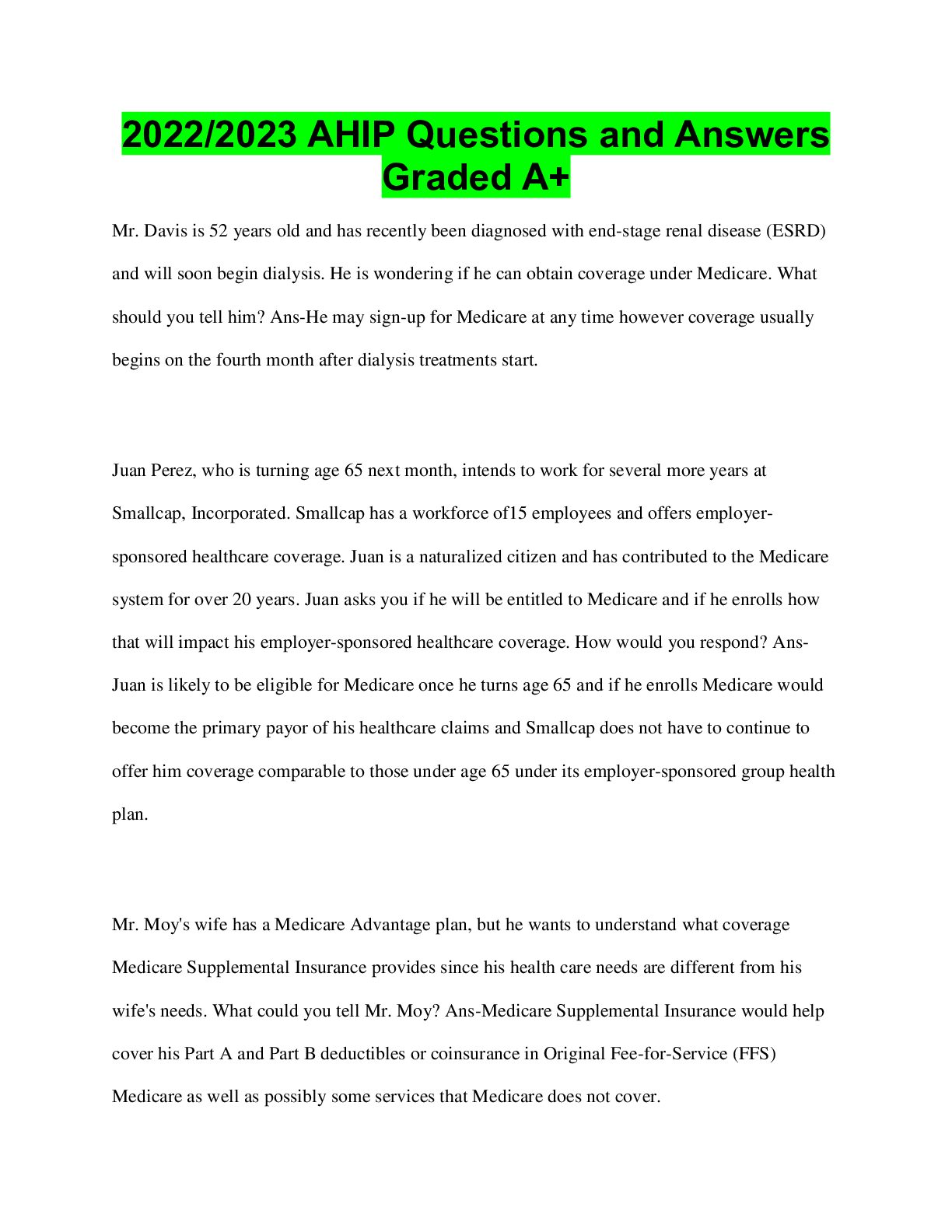*NURSING > CASE STUDY > (Answered)NURS 6630/ Nurs6630n Discussion: Treatment for a Patient With a Common Condition(Case: An (All)
(Answered)NURS 6630/ Nurs6630n Discussion: Treatment for a Patient With a Common Condition(Case: An elderly widow who just lost her spouse.)
Document Content and Description Below
Case: An elderly widow who just lost her spouse. Subjective: A patient presents to your primary care office today with chief complaint of insomnia. Patient is 75 YO with PMH of DM, HTN, and MDD. Her... husband of 41 years passed away 10 months ago. Since then, she states her depression has gotten worse as well as her sleep habits. The patient has no previous history of depression prior to her husband’s death. She is awake, alert, and oriented x3. Patient normally sees PCP once or twice a year. Patient denies any suicidal ideations. Patient arrived at the office today by private vehicle. Patient currently takes the following medications: Metformin 500mg BID Januvia 100mg daily Losartan 100mg daily HCTZ 25mg daily Sertraline 100mg daily Current weight: 88 kg Current height: 64 inches Temp: 98.6 degrees F BP: 132/86 Three Questions to Ask the Patient, Rationale Why You Would Ask These Questions 1) When did your PCP start you on Sertraline 100mg daily? Has this helped/worsened your symptoms of depression and insomnia? a. Rationale: Knowing when she started taking the Sertraline would allow the provider to assess if this medication has been effective at reducing her symptoms or if she has any adverse effects. If she has been taking this medication for more than 4-6 weeks, reports no adverse effects, and reports no/minimal improvement in her symptoms, it would be beneficial to try a different antidepressant medication. This study source was downloaded by 100000860583932 from CourseHero.com on 01-26-2023 10:48:50 GMT -06:00 https://www.coursehero.com/file/150766511/Wk7-Discussion-Post-Initialdocx/ 2 2) How many hours have you been sleeping per night, and what have you tried to help sleep? Did you have sleep problems prior to your husband passing away? a. Rationale: Knowing how many hours she is getting and if she has a history of sleep problems will allow the provider to assess for new-onset sleeping problems compared to a history of sleeping problems that the current situation has exacerbated. Also, knowing if she has tried anything to help her sleep thus far would be helpful to determine how to proceed with addressing her insomnia concern. 3) Do you have a support system (family/friends) for you to talk about how you are feeling, or can you be there if you are having a difficult day? a. Rationale: Knowing if she has an established support system in place will allow the provider to begin to build a rapport with the patient and will allow them to determine if she is at a higher risk for loneliness and isolation, which can increase her risk for social isolation and profound depression (Berman et al., 2020). Further Assessment and Feedback of Patients Situation, Specific Questions Based on the answers to the three questions asked of the patient, I would then want to proceed with talking to any friends and family included in her support system to see how they feel that she is coping. Any concerns they may have about her safety, environment, health, and wellbeing (Hladek et al., 2020). It would be essential to ask questions such as: Is she taking her medications? How has her appetite been? How has her mood been? Have they noticed any changes in her interests and enjoyment in completing activities like before? Any changes in her memory or any signs of anxiety? It would also be beneficial to talk with these people to see if This study source was downloaded by 100000860583932 from CourseHero.com on 01-26-2023 10:48:50 GMT -06:00 https://www.coursehero.com/file/150766511/Wk7-Discussion-Post-Initialdocx/ 3 they can continue providing the needed support for the patient or if other supports need to be implemented, such as support groups, etc. Recommended Physical Exams and Diagnostic Tests While assessing this patient, it would be essential to complete a depression screening. This could be accomplished in several ways, including the Geriatric Depression Scale (GDS), which is used in community settings for those patients that are sixty years of age and older (Nagar et al., 2021). Completing the Global Assessment of Functioning (GAF-F) scale would also be essential to see how the patient is functioning or if she may need more help to reduce her risk for functional deterioration while working through her grief and depression (Shimizu et al., 2020) It would also be beneficial to complete the Mini-Mental State Exam (MMSE) to evaluate her cognitive function and ensure that she is not having concerns with thinking, communication, understanding, and memory. The provider would also need to complete labs, including TSH, Vitamin D Level, B12, CBC, and HgbA1c, to rule out medical problems that may be causing the changes in her mood. Depression-type symptoms can be present from vitamin D deficiency, hypothyroidism, anemia, diabetes, and B12 deficiency. Wang et al. (2022) found that patients with comorbid conditions such as hypertension and depression need combination treatments for their depression and other conditions to have improved outcomes. The final assessment that I would complete is the Prolonged Grief Disorder Scale (PG-13), showing if the patient was suffering from prolonged grief (Treml et al., 2020). Potential Differential Diagnosis A differential diagnosis for this patient would be prolonged grief disorder (PGD). According to Treml et al. (2020), PGD is characterized by depressive symptoms, sleep disturbances, and reduced satisfaction and quality of life. Shimizu et al. (2020) reported that 15- This study source was downloaded by 100000860583932 from CourseHero.com on 01-26-2023 10:48:50 GMT -06:00 https://www.coursehero.com/file/150766511/Wk7-Discussion-Post-Initialdocx/ 4 30% of elderly that have lost a loved one are later diagnosed with significant depression. PGD is more prevalent in older women and those that are less educated and have limited social support (Treml et al., 2020). PGD is classified by having increased symptoms for at least six months which this patient has had since her spouse passed away ten months ago. Recommended Antidepressant Therapy, Why The first medication that I would recommend would [Show More]
Last updated: 2 years ago
Preview 1 out of 6 pages

Buy this document to get the full access instantly
Instant Download Access after purchase
Buy NowInstant download
We Accept:

Reviews( 0 )
$8.00
Can't find what you want? Try our AI powered Search
Document information
Connected school, study & course
About the document
Uploaded On
Jan 26, 2023
Number of pages
6
Written in
Additional information
This document has been written for:
Uploaded
Jan 26, 2023
Downloads
0
Views
141




